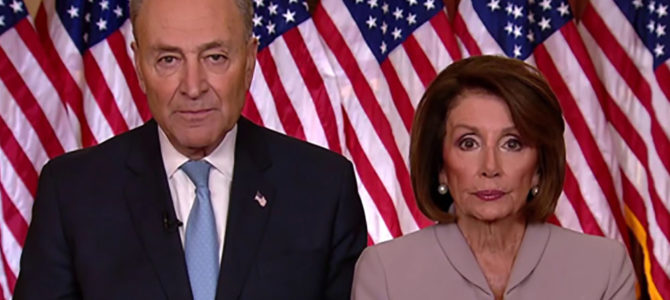
WASHINGTON, D.C. — The Senate reached a new coronavirus agreement in the early hours of Wednesday morning, three days after Speaker of the House Nancy Pelosi torpedoed a bipartisan deal. Democrats were quick to claim a great victory for America, and their allies in the media have been just as fast to parrot that, but based on the draft so far released, the new deal is much the same as the old deal– and the changes struggle to justify delaying the much-needed aid for days while businesses closed and people died.
“To the American people we say, ‘Big help, quick help is on the way, because we face about the most unprecedented health crisis we have,'” Senate Minority Leader Chuck Schumer told CNN after the early deal was announced. “The five pillars that we fought for to make the bill better, much better than the bill Friday, are all in the bill.”
So what was really accomplished? The final text hasn’t been released and details are still being hammered out, but the latest draft indicates changes since Monday were almost entirely cosmetic and few will be controversial with House or Senate Republicans.
Pillar 1) Health care
The first of Schumer’s “five pillars” is $130 billion in funding for hospitals. While his statement called this a $55 billion increase, Monday’s draft included $127 billion for hospitals and health care providers. There’s a $3 billion difference here, nowhere near $55 billion– and on Capitol Hill there is unanimous agreement that aid is needed now and in incredible amounts. In a letter to congressional colleagues, Schumer additionally claims Democrats won “$1 billion for the Indian Health Service,” but that number was included in Monday’s bill.
Pillar 2) American workers
The second “pillar” of the deal, according to Schumer, is it is “worker-friendly, workers first,” he told CNN. “We didn’t want to put corporations first. We thought the original bill did that too much.”
The most recent draft extends unemployment insurance to 16 weeks, “increases the maximum unemployment benefit by $600 per week,” bans stock buybacks from corporations for a year after government assistance ends, helps keep the airlines operating, and protects workers at companies receiving aid, “including Americans who have non-traditional employment … [and] “allowing furloughed workers to stay on as employees.” The Monday bill Schumer’s Democrats filibustered, however, extended unemployment insurance to 14 weeks and did every single other one of the things Schumer is claiming, though the furlough protection is now the subject of emergency negotiation after a “drafting error.”
Undeterred, The New York Times called this “a significant expansion of unemployment benefits.” Other outlets have unthinkingly repeated this claim.
There are some additions, many of which Republicans don’t oppose and all of which are difficult to square with the long delay. Schumer is touting that the post-filibuster bill includes a tax credit to help companies keep employees salaried, though before the negotiation broke down Republican Minority Leader Kevin McCarthy pushed for this with broad House GOP support. Schumer is bragging Democrats stripped the legislation of the president’s request to buy $3 billion of cheap oil to restock America’s strategic reserves, calling this a bailout for Big Oil, though there’s a decent chance the buy is included in future legislation. The new bill does include a tax credit for student loans.
Pillar 3) States and local governments
The renegotiation, Schumer told CNN, finally provides “real help” for the states. His letter touts $150 billion for state and local governments, “$30 billion in emergency education funding and $25 billion in emergency transit funding,” and $45 billion for the Disaster Relief Fund. While the additional $150 billion to states and tribes might be the biggest change in the two versions, the previous bill included $10 billion in block grants to states as well as $242 billion for states and local governments (which has been retained), plus the same amounts for education, transit and disaster relief funding.
Pillar 4) Oversight and accountability
Schumer highlighted his work with former presidential candidate Elizabeth Warren to push oversight of the rollout, though there is only one additional measure that irks Republicans and based on press statements and interviews with House and Senate staff, they can live with it. Democrats say this pillar includes eliminating a “secret bailout” provision, mandates real-time reporting from the Treasury on assistance details, and establishes a special inspector general and Pandemic Accountability Committee.
The problem with the first bit is there was no secret bailout: True, the earlier version did not require the Department of the Treasury to publicly release its loans for six months, but it did require Treasury to report its loans to Congress. Neither House nor Senate Republicans The Federalist spoke with had any issue with increasing Treasury transparency, though one called the IG and committee “transparency through bureaucracy… annoying but fine.”
Pillar 5) Small businesses
The filibuster accomplished the least for the vast majority of America’s small businesses, which were the main reason of this round of aid. Schumer’s letter says the newest negotiations gained “$17 billion for SBA to cover 6 months of payments for small businesses with existing SBA loans … $10 billion for SBA emergency grants of up to $10,000 to provide immediate relief for small business operating costs,” and makes “rent, mortgage and utility costs eligible for SBA loan forgiveness”— all provisions that were in earlier drafts.
There is one addition, which Politico notes “Schumer’s office is really eager to point out:” Stimulus help is forbidden from going to businesses owned “by the president, vice president, members of Congress, and heads of executive departments.”
“So that’s what is in the bill,” Schumer bragged Wednesday, “and it is a good bill.”
“They’re trying to carve out a victory here for stuff that was almost all in earlier bills and it’s just ridiculous,” one congressional chief of staff told The Federalist. “There are some modest changes but it’s ridiculous we had to wait four days for things that aren’t even controversial. … What I’m hearing is the more controversial stuff is being pushed off for phase four, and if that’s the case what was all this for? How many people lost their jobs for stuff around the margins? Even House Freedom Caucus members are talking about how we need more robust unemployment coverage.”
“We are already behind,” McCarthy agreed in a Wednesday press release. “For the past three days, Democrat leadership in Congress took their eye off the ball, delaying consideration of this bipartisan-crafted bill. They insisted on using this crisis as an opportunity to propose completely unrelated legislation that amounted to an ideological wish list. And they spent more time crafting press releases than policy solutions. The countless hours wasted on partisan posturing served no meaningful purpose – all while resources were delayed for more Americans who became sick or lost their jobs.”
“This is the art of compromise,” Schumer told CNN. “This is the art of coming together. America needed huge help quickly and I think we’ve risen to that occasion.”
His House counterpart does not appear to share the nation’s sense of urgency. “House Democrats will now review the final provisions and legislative text of the agreement to determine a course of action,” Pelosi commented. The House was in session from 10:00:42 a.m. – 10:02:37 a.m., closing out after just one minute and 55 seconds. They’ll be back tomorrow, just before lunch.








